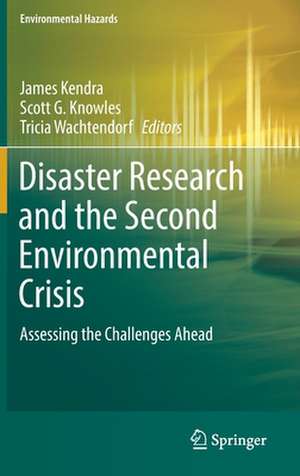Disaster Research and the Second Environmental Crisis: Assessing the Challenges Ahead: Environmental Hazards
Editat de James Kendra, Scott G. Knowles, Tricia Wachtendorfen Limba Engleză Hardback – 18 apr 2019
Preț: 899.38 lei
Preț vechi: 1096.80 lei
-18% Nou
Puncte Express: 1349
Preț estimativ în valută:
172.09€ • 180.64$ • 142.84£
172.09€ • 180.64$ • 142.84£
Carte tipărită la comandă
Livrare economică 10-24 aprilie
Preluare comenzi: 021 569.72.76
Specificații
ISBN-13: 9783030046897
ISBN-10: 3030046893
Pagini: 250
Ilustrații: X, 351 p. 12 illus.
Dimensiuni: 155 x 235 mm
Greutate: 0.69 kg
Ediția:1st ed. 2019
Editura: Springer International Publishing
Colecția Springer
Seria Environmental Hazards
Locul publicării:Cham, Switzerland
ISBN-10: 3030046893
Pagini: 250
Ilustrații: X, 351 p. 12 illus.
Dimensiuni: 155 x 235 mm
Greutate: 0.69 kg
Ediția:1st ed. 2019
Editura: Springer International Publishing
Colecția Springer
Seria Environmental Hazards
Locul publicării:Cham, Switzerland
Cuprins
Chapter 1. Introduction: The New Environmental Crisis.- Part I: Locating Disaster Studies.- Chapter 2. Launching the DRC: Historical Context and Future Directions(Thomas E. Drabek).- Chapter 3. Disaster Studies at 50: Time to Wear Bifocals?(Ben Wisner).- Part II: Confronting the Second Environmental Crisis.- Chapter 4. The Silence Before the Storm: Advocacy Groups’ Current Perceptions of Future Climate Vulnerability(Carlos Martin).- Chapter 5. Beautiful and Safe Landscapes for Sustainable Disaster Risk Reduction.(Fausto Marincioni, Cristina Casareale, and Kenneth Byrne).- Chapter 6. Mobilizing Communities to Confront Global Challenges: A Phronetic Inquiry.(Philip Barnes and Andrea Sarzynski).- Chapter 7. Sleepwalking into disaster? Understanding Coping in the Broader Field of Mental Barriers.(Anna Lena Bercht).- Chapter 8. Growing the Constituency: A 21st Century Challenge. (James K. Mitchell).- Chapter 9. The Role of Landscape Experience in Disaster Risk Reduction.(Sara Bonati).- Part III: Old Problems with New Solutions.- Chapter 10. Building Disaster Resilience on the Edge of Chaos - A Systems Critique on Mechanistic Global Disaster Reduction Policies, Frameworks and Models.(Christo Coetzee, Dewald van Niekerk and Leandri Kruger).- Chapter 11. Services Not Required? Assessing the Need for ‘Coordination Agencies’ during Disaster Response.(Johanu Botha).- Chapter 12. Categories of Success: How Do We Make Who Listens?(Rachel Dowty and William Wallace).- Chapter 13. The Emergency Manager as Risk Manager 5.(Patrick S. Roberts, Kris Wernstedt, Joseph Arvai, and Kelly Redmond).- Chapter 14. Disaster Response as Secondary Hazard.(Malka Older).- Chapter 15.- Compromise and Action: Tactics for Doing Ethical Research in Disaster Zones.(Jennifer Henderson and Max Liboiron).- Chapter 16. Ethics in Disaster Research: A New Declaration.(James Kendra and Sarah Gregory).- Chapter 17. A Case for the Grand Challenge of Disaster Science.(Tricia Wachtendorf).
Textul de pe ultima copertă
The 50th anniversary of the Disaster Research Center of the University of Delaware provoked a discussion of the field’s background, its accomplishments, and its future directions. Participants representing many disciplines brought new methods to bear on perennial problems relevant to effective disaster management and policy formation. However, new concerns were raised, stemming from the fact that we live today in a globally unfolding environmental crisis every bit as pressing and worrisome as that of the 1960s when the Disaster Research center was founded. This volume brings together ideas of participants from that workshop as well as other contributors. Topics include: the history and evolution of disaster research, innovations in disaster management, disaster policy, and ethical considerations of disaster research. Readers interested in science and technology, public policy, community action, and the evolution of the social sciences will find much of interest in this collection.
Caracteristici
The book will probe the state of the art of disaster knowledge in several of the most puzzling areas Contributors are acknowledged experts in their fields The work will strive for an integration and synthesis of key ideas but will probe past easy explanations for hazard such as "lack of political will"






